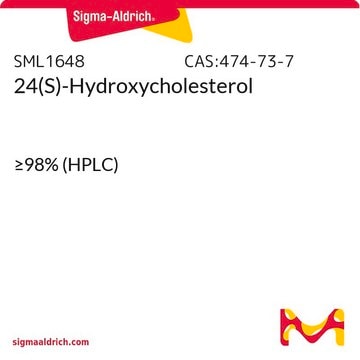C2773
Cholesterol 5α,6α-epoxide
Synonym(s):
5α,6α-Epoxycholestan-3β-ol
About This Item
Recommended Products
Assay
≥80%
form
powder
functional group
epoxy
shipped in
ambient
storage temp.
room temp
SMILES string
[H][C@@]12[C@]([C@](CC[C@H](O)C3)(C)[C@@]3(O4)[C@@H]4C2)([H])CC[C@@]5(C)[C@@]1([H])CC[C@]5([H])[C@]([H])(C)CCCC(C)C
InChI
1S/C27H46O2/c1-17(2)7-6-8-18(3)21-9-10-22-20-15-24-27(29-24)16-19(28)11-14-26(27,5)23(20)12-13-25(21,22)4/h17-24,28H,6-16H2,1-5H3/t18-,19+,20+,21-,22+,23+,24+,25-,26-,27+/m1/s1
InChI key
PRYIJAGAEJZDBO-ZEQHCUNVSA-N
Application
Biochem/physiol Actions
Preparation Note
Storage Class Code
11 - Combustible Solids
WGK
WGK 3
Flash Point(F)
Not applicable
Flash Point(C)
Not applicable
Personal Protective Equipment
Certificates of Analysis (COA)
Search for Certificates of Analysis (COA) by entering the products Lot/Batch Number. Lot and Batch Numbers can be found on a product’s label following the words ‘Lot’ or ‘Batch’.
Already Own This Product?
Find documentation for the products that you have recently purchased in the Document Library.
Customers Also Viewed
Our team of scientists has experience in all areas of research including Life Science, Material Science, Chemical Synthesis, Chromatography, Analytical and many others.
Contact Technical Service














